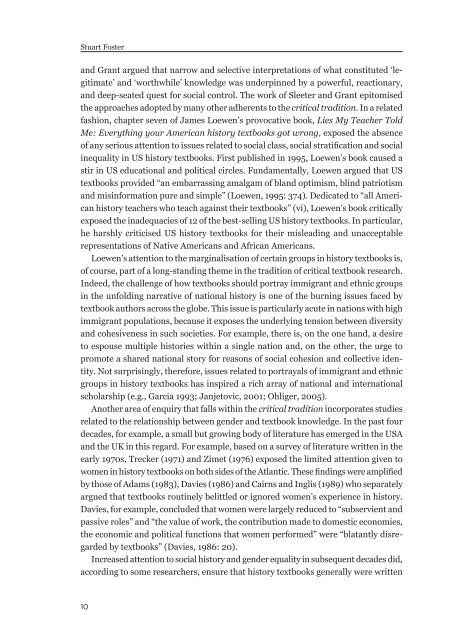Dominant Traditions in International Textbook Research and Revision
Dominant Traditions in International Textbook Research and Revision
Dominant Traditions in International Textbook Research and Revision
You also want an ePaper? Increase the reach of your titles
YUMPU automatically turns print PDFs into web optimized ePapers that Google loves.
Stuart Foster<br />
<strong>and</strong> Grant argued that narrow <strong>and</strong> selective <strong>in</strong>terpretations of what constituted ‘legitimate’<br />
<strong>and</strong> ‘worthwhile’ knowledge was underp<strong>in</strong>ned by a powerful, reactionary,<br />
<strong>and</strong> deep-seated quest for social control. The work of Sleeter <strong>and</strong> Grant epitomised<br />
the approaches adopted by many other adherents to the critical tradition. In a related<br />
fashion, chapter seven of James Loewen’s provocative book, Lies My Teacher Told<br />
Me: Everyth<strong>in</strong>g your American history textbooks got wrong, exposed the absence<br />
of any serious attention to issues related to social class, social stratification <strong>and</strong> social<br />
<strong>in</strong>equality <strong>in</strong> US history textbooks. First published <strong>in</strong> 1995, Loewen’s book caused a<br />
stir <strong>in</strong> US educational <strong>and</strong> political circles. Fundamentally, Loewen argued that US<br />
textbooks provided “an embarrass<strong>in</strong>g amalgam of bl<strong>and</strong> optimism, bl<strong>in</strong>d patriotism<br />
<strong>and</strong> mis<strong>in</strong>formation pure <strong>and</strong> simple” (Loewen, 1995: 374). Dedicated to “all American<br />
history teachers who teach aga<strong>in</strong>st their textbooks” (vi), Loewen’s book critically<br />
exposed the <strong>in</strong>adequacies of 12 of the best-sell<strong>in</strong>g US history textbooks. In particular,<br />
he harshly criticised US history textbooks for their mislead<strong>in</strong>g <strong>and</strong> unacceptable<br />
representations of Native Americans <strong>and</strong> African Americans.<br />
Loewen’s attention to the marg<strong>in</strong>alisation of certa<strong>in</strong> groups <strong>in</strong> history textbooks is,<br />
of course, part of a long-st<strong>and</strong><strong>in</strong>g theme <strong>in</strong> the tradition of critical textbook research.<br />
Indeed, the challenge of how textbooks should portray immigrant <strong>and</strong> ethnic groups<br />
<strong>in</strong> the unfold<strong>in</strong>g narrative of national history is one of the burn<strong>in</strong>g issues faced by<br />
textbook authors across the globe. This issue is particularly acute <strong>in</strong> nations with high<br />
immigrant populations, because it exposes the underly<strong>in</strong>g tension between diversity<br />
<strong>and</strong> cohesiveness <strong>in</strong> such societies. For example, there is, on the one h<strong>and</strong>, a desire<br />
to espouse multiple histories with<strong>in</strong> a s<strong>in</strong>gle nation <strong>and</strong>, on the other, the urge to<br />
promote a shared national story for reasons of social cohesion <strong>and</strong> collective identity.<br />
Not surpris<strong>in</strong>gly, therefore, issues related to portrayals of immigrant <strong>and</strong> ethnic<br />
groups <strong>in</strong> history textbooks has <strong>in</strong>spired a rich array of national <strong>and</strong> <strong>in</strong>ternational<br />
scholarship (e.g., Garcia 1993; Janjetovic, 2001; Ohliger, 2005).<br />
Another area of enquiry that falls with<strong>in</strong> the critical tradition <strong>in</strong>corporates studies<br />
related to the relationship between gender <strong>and</strong> textbook knowledge. In the past four<br />
decades, for example, a small but grow<strong>in</strong>g body of literature has emerged <strong>in</strong> the USA<br />
<strong>and</strong> the UK <strong>in</strong> this regard. For example, based on a survey of literature written <strong>in</strong> the<br />
early 1970s, Trecker (1971) <strong>and</strong> Zimet (1976) exposed the limited attention given to<br />
women <strong>in</strong> history textbooks on both sides of the Atlantic. These f<strong>in</strong>d<strong>in</strong>gs were amplified<br />
by those of Adams (1983), Davies (1986) <strong>and</strong> Cairns <strong>and</strong> Inglis (1989) who separately<br />
argued that textbooks rout<strong>in</strong>ely belittled or ignored women’s experience <strong>in</strong> history.<br />
Davies, for example, concluded that women were largely reduced to “subservient <strong>and</strong><br />
passive roles” <strong>and</strong> “the value of work, the contribution made to domestic economies,<br />
the economic <strong>and</strong> political functions that women performed” were “blatantly disregarded<br />
by textbooks” (Davies, 1986: 20).<br />
Increased attention to social history <strong>and</strong> gender equality <strong>in</strong> subsequent decades did,<br />
accord<strong>in</strong>g to some researchers, ensure that history textbooks generally were written<br />
10

















